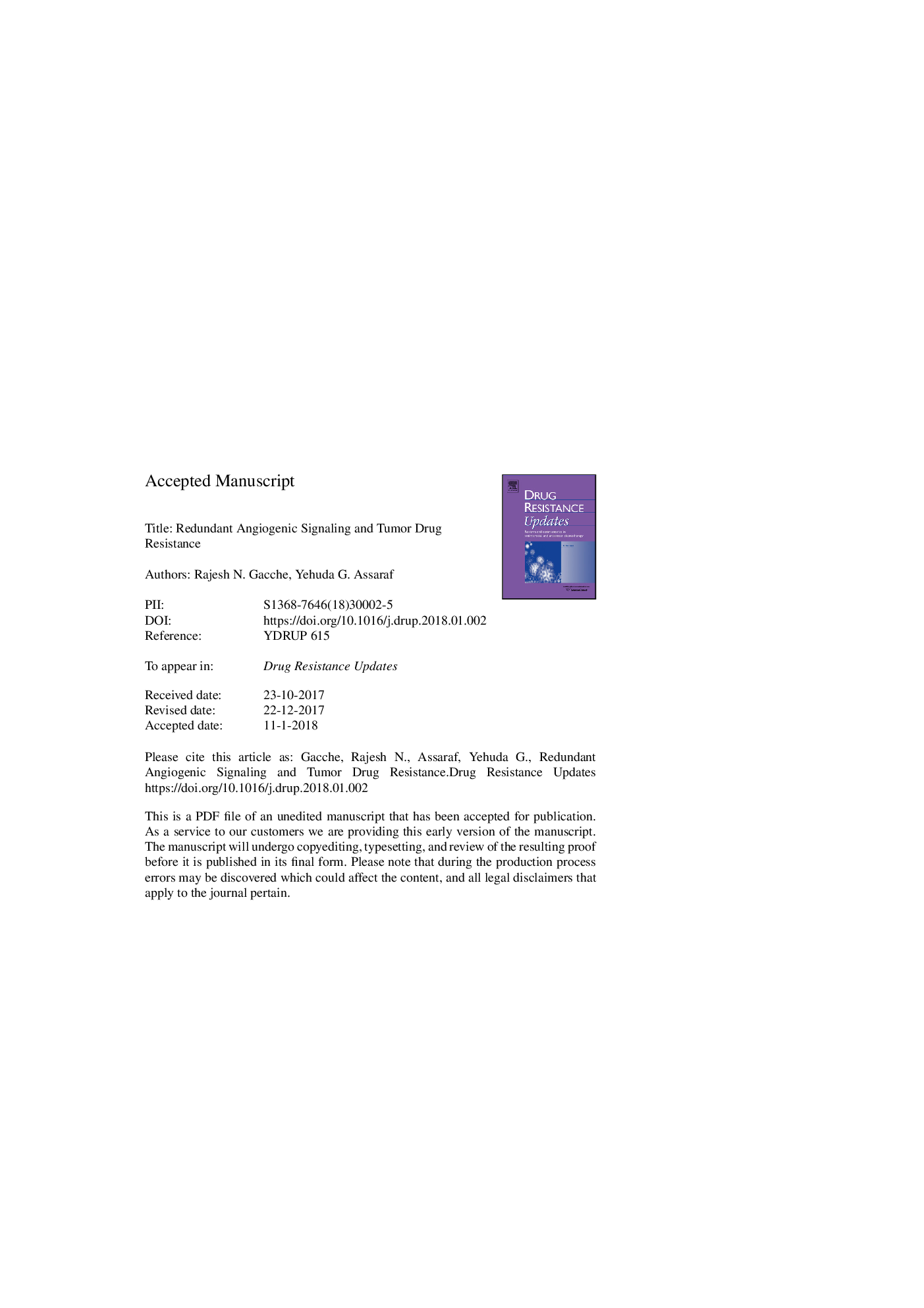| کد مقاله | کد نشریه | سال انتشار | مقاله انگلیسی | نسخه تمام متن |
|---|---|---|---|---|
| 8436506 | 1546829 | 2018 | 99 صفحه PDF | دانلود رایگان |
عنوان انگلیسی مقاله ISI
Redundant angiogenic signaling and tumor drug resistance
ترجمه فارسی عنوان
سیگنالینگ آنژیوژنیک و مقاومت دارویی تومور
دانلود مقاله + سفارش ترجمه
دانلود مقاله ISI انگلیسی
رایگان برای ایرانیان
کلمات کلیدی
ECMEGFRNF-κBPI3KTNBCEGFTNFαMDRCOXMmpsNRPEMACSCsmTORTGFβFAKFGFERKImgRASHUVECTCFRAFDSLGBMHIF-1αPKCSCIDENGCXCR4EPCsGSK3βBcl-xLALK1MMTVSCFWntBMDCsCCLPDGFFGFRPericytesNICDVHLSDF-1αCXCLRCCHGFZEB2TIE2PlGFVEGFRM-CSFPDGFRαSMARTKCAFsFZDfrizzledJagged-1PNETsEndoglinJAG1CSF-1Zinc finger E-box binding homeobox 2colony stimulating factor-1TAMsPHD2C-C motif ligandCirculating endothelial progenitorsTEMSTAFsBv8FDAVDACEPSProlyl hydroxylase 2PyMTC-X-C motif ligandJanus kinase - کیناز جانوس c-Met - c-metdll4 - DLL4ECs - EC هاMAPK - MAPKSTAT - آمارcyclooxygenase - آنزیم سیکلواکسیژنازangiopoietin - آنژیوپوئیتینAngiogenesis - آنژیوژنزEuropean Medicines agency - آژانس دارویی اروپاvon Hippel-Lindau - از Hippel-Lindauhydroxyeicosatetraenoic acid - اسید هیدروکسی اسیستاترونیکEph - افα-smooth muscle actin - اکتین عضله آلفا صافinterleukin - اینترلوکینtransforming growth factor-β - تبدیل فاکتور رشد βvasculogenic mimicry - تقلید واسنجیTumor associated macrophages - تومور مرتبط با ماکروفاژهاtumor necrosis factor α - تومور نکروز عامل αPancreatic neuroendocrine tumors - تومورهای نورونودرایدی پانکراسEMT - تکنسین فوریتهای پزشکیcluster differentiation - خوشه بندی تمایزAnti-angiogenic drugs - داروهای ضد انجیوژنNotch intracellular domain - دامنه درون سلولی NotchPCs - رایانه های شخصیFood and Drug Administration - سازمان غذا و داروNSCLC - سرطان ریوی غیر سلول کوچکNon-small cell lung cancer - سرطان غیر سلول کوچک ریهTriple-negative breast cancer - سرطان پستان سه گانه منفیHuman umbilical vein endothelial cells - سلول های اندوتلیالی ورید ناف انسانbone marrow derived cells - سلول های مشتق شده مغز استخوانEndothelial progenitor cells - سلول های پیش ساز اندوتلیالEndothelial cells - سلولهای اندوتلیالCancer stem cells - سلولهای بنیادی سرطانیT-cell factor - عامل T-cellVascular disrupting agents - عامل اختلال عروقیhypoxia inducible factor 1α - عامل القایی هیپوکسی 1αepidermal growth factor - عامل رشد اپیدرمیplacental growth factor - عامل رشد جفتHepatocyte growth factor - عامل رشد هپاتوسیتGranulocyte-colony stimulating factor - فاکتور تحریک گرانولیسیت کلنیVascular endothelial growth factor - فاکتور رشد اندوتلیال عروقیVascular Endothelial Growth Factor (VEGF) - فاکتور رشد اندوتلیال عروقی (VEGF)platelet derived growth factor - فاکتور رشد حاصل از پلاکتfibroblast growth factor - فاکتور رشد فیبروبلاستStem Cell Factor - فاکتور سلول بنیادیG-CSF - فاکتور محرک کُلونی گرانولوسیتnuclear factor-κB - فاکتور هسته ای κBPhosphatidylinositol 3-kinase - فسفاتیدیلینواستیل 3-کینازTumor-associated fibroblasts - فیبروبلاست های مرتبط با تومورrapidly accelerated fibrosarcoma - فیبروسارکوم سریعا شتاب می گیردB-cell lymphoma-extra large - لنفوم سلول B-فوق العاده بزرگ استextra cellular matrix - ماتریس سلولی اضافیSignal transducer and activator of transcription - مبدل سیگنال و فعال کننده رونویسیMatrix metalloproteinases - متالوپروتئیناز ماتریکسBMP - مدیریت فرایند کسب و کارbone marrow - مغز استخوانMultidrug resistance - مقاومت چند داروییNeuropilin - نوروپیلینmammalian target of rapamycin - هدف پستانداران رپامایسینHETE - هفتهMouse mammary tumor virus - ویروس تومور پستان موشBone morphogenetic protein - پروتئین مورفوژنیک استخوانProtein kinase C - پروتئین کیناز سیmitogen-activated protein kinase - پروتئین کیناز فعال با mitogenplatelet derived growth factor receptor - پلاکت گیرنده فاکتور رشدJAK - چگونهRenal cell carcinoma - کارسینوم سلول کلیوی یا RCC severe combined immunodeficiency - کمبود شدید مصدومCOUP-TFII - کودتا TFIIextracellular signal-regulated kinase - کیناز تنظیم شده سیگنال خارج سلولیfocal adhesion kinase - کیناز چسبندگی کانونیEpithelial-mesenchymal transition - گذار اپیتلیال-مزانشیمیGlioblastoma multiforme - گلیوبلاستوم مولتیفرم، گلیوبلاستوماReceptor Tyrosine Kinase - گیرنده تیروزین کینازvascular endothelial growth factor receptor - گیرنده فاکتور رشد اندوتلیال عروقیEpidermal growth factor receptor - گیرنده فاکتور رشد اپیدرمالfibroblast growth factor receptor - گیرنده فاکتور رشد فیبروبلاست
موضوعات مرتبط
علوم زیستی و بیوفناوری
بیوشیمی، ژنتیک و زیست شناسی مولکولی
تحقیقات سرطان
چکیده انگلیسی
Angiogenesis research in the past two decades has contributed significantly towards understanding the molecular pathophysiology of cancer progression and inspired target-oriented research and pharma industry for the development of novel anti-angiogenic agents. Currently, over eleven drugs targeting angiogenesis have been approved by the FDA for the treatment of various malignancies. Of the registered anti-angiogenic clinical trials until the end of 2017 (ClinicalTrials.gov), over 47% were completed, 10% were terminated, 3% withdrawn, over 0.5% were suspended and only 4 trials have culminated in FDA approval for marketing. On the one hand, the clinical benefits of anti-angiogenic drugs prompted the development of novel anti-angiogenic agents. On the other hand, however, a plethora of recent studies demonstrated the emergence of tumor drug resistance towards currently used anti-angiogenic therapeutics. Series of preclinical and clinical studies have highlighted the enigma of drug resistance with functional bypass pathways, and identified compensatory or alternative angiogenic mechanisms assuring tumor growth in the midst of an anti-angiogenic stress environment. In the present review the classical literature of such redundant angiogenic pathways in concert with the key angiogenic factors and specialized cells involved in anti-angiogenic escape mechanisms is described. A strategic discourse regarding increasing tumor drug resistance and future modalities for anti-angiogenic therapy is also discussed in view of recent advances.
ناشر
Database: Elsevier - ScienceDirect (ساینس دایرکت)
Journal: Drug Resistance Updates - Volume 36, January 2018, Pages 47-76
Journal: Drug Resistance Updates - Volume 36, January 2018, Pages 47-76
نویسندگان
Rajesh N. Gacche, Yehuda G. Assaraf,
